The Corruption of Creation:
Introduction: The Distortion of God’s Good Creation
On this Sunday, we are called to reflect on a profound and sobering truth: the corruption of creation. While God’s creation was initially deemed “very good” (Genesis 1:31), we witness through the scriptures today how creation has been distorted, marred by human sin, greed, and indifference. This corruption is not just about the environment—it is about the deep spiritual disconnect between God, humanity, and creation itself. As we explore the scriptures today, we will see the consequences of this corruption and how God calls us to repent, seek restoration, and work toward ecological and spiritual justice.
1. The Song of the Vineyard: The Consequences of Israel’s Unfaithfulness (Isaiah 5:1-13)
In Isaiah 5:1-13, the prophet Isaiah tells the “Song of the Vineyard,” a poignant allegory of God’s relationship with Israel. God, the loving vine-grower, plants a vineyard on a fertile hillside, expecting it to bear good fruit. He clears the land, builds a watchtower, and creates a winepress, but when He looks for good grapes, He finds only bad fruit. God had given His people every opportunity to thrive—He had nurtured them, protected them, and established them as His people—but they failed to live up to His expectations. Instead of justice, there was bloodshed; instead of righteousness, there was distress.
This parable paints a tragic picture of creation’s corruption. The vineyard, which symbolizes Israel, represents how God’s creation is intended to flourish in goodness, justice, and righteousness. But the bad fruit signifies the brokenness of the world—human sinfulness, greed, exploitation, and disregard for God’s purpose.
Application: God’s disappointment with the vineyard speaks to our own lives and the state of the world today. Just as Israel failed to produce the good fruit that God desired, we too often fail to live in alignment with His purposes for creation. We exploit resources, harm the environment, and neglect justice, all while ignoring God’s original design for harmony and flourishing. The corruption of creation is not only visible in the natural world but also in the societal structures we build that perpetuate inequality and injustice.
2. The Majesty of Creation: Our Responsibility to Care (Psalm 8)
In stark contrast to the corruption of creation described in Isaiah, Psalm 8 reflects on the majestic beauty of God’s creation. The psalmist praises God for the wonders of the heavens, the moon and the stars, and marvels at the place of human beings in this vast universe. “You have made them a little lower than the angels and crowned them with glory and honor” (Psalm 8:5). Humanity is given dominion over the works of God’s hands, from the flocks and herds to the birds and the fish.
This passage reminds us of the dignity and responsibility that God has bestowed upon humanity. We are not merely passive observers of creation but active stewards and caretakers. We are entrusted with the responsibility to manage and care for the earth, not to exploit it, but to honor God’s creation as a reflection of His glory.
Application: While Psalm 8 speaks to the wonder of creation, it also serves as a call to responsibility. When we reflect on the greatness of creation, we are reminded that our role is not to dominate or destroy but to protect and preserve. When we fail to live in harmony with creation, we disfigure the very work of God’s hands. The corruption of creation occurs when we forget our role as caretakers and instead live in ways that harm and diminish the earth.
3. The Danger of False Gospels: Misguided Pursuits (Galatians 1:5-10)
In Galatians 1:5-10, Paul addresses the issue of false gospels that lead people astray. He is astonished that the Galatians are so quickly deserting the true gospel of Christ and turning to a distorted version that does not lead to salvation. Paul warns that any gospel other than the one preached by Christ is not good news at all but a perversion of the truth.
The underlying issue here is the temptation to seek fulfillment in worldly pursuits—whether materialism, selfishness, or sin—rather than in the truth of the gospel. When we follow false gospels, we corrupt not only our spiritual lives but also our relationship with creation. The pursuit of wealth and power at the expense of others and the environment is an example of how human greed leads to the degradation of creation.
Application: We must examine our hearts and our motivations. Are we living according to the true gospel of Christ, which calls us to love, serve, and care for others? Or are we being influenced by false gospels of greed, consumerism, and self-interest? These false pursuits corrupt the goodness of God’s creation and lead us into deeper spiritual and ecological ruin. The corruption of creation is often rooted in our rejection of God’s truth and our pursuit of fleeting pleasures that harm the world around us.
4. Woe to Those Who Ignore God’s Work (Luke 10:13-16)
In Luke 10:13-16, Jesus pronounces woes on the cities of Chorazin, Bethsaida, and Capernaum for their failure to repent despite witnessing His miracles. Jesus points out that if the same miracles had been performed in Tyre and Sidon, notorious for their sinfulness, they would have repented. Yet, these cities, blessed with the presence of Jesus, failed to recognize and respond to the truth of God.
The failure of these cities to heed Jesus’ message is a stark reminder of the corruption that can take root when people turn away from God’s Word. The same is true for creation: when we fail to recognize and honor God’s design for the world, we corrupt it. This passage speaks to the importance of listening to God’s message and repenting of the ways we contribute to the degradation of creation.
Application: Jesus’ warning to these cities calls us to examine our own hearts. Have we ignored God’s call to care for creation? Have we failed to recognize the importance of justice, stewardship, and repentance? Just as the cities were held accountable for their rejection of Christ, we too will be held accountable for how we treat the world that God has entrusted to us. Our failure to act in accordance with God’s purposes for creation leads to further corruption, both spiritually and environmentally.
Conclusion: A Call to Repentance and Restoration
The corruption of creation is a result of human sin, greed, and a failure to recognize God’s design. But the good news is that God is calling us to repentance. Just as the vineyard in Isaiah was meant to bear good fruit, we are called to produce justice, righteousness, and care for the earth. We are not powerless in this situation. God has entrusted us with the task of stewarding creation, and through Christ, we can find restoration.
Now is the time to examine our lives and our relationship with creation. Let us repent of the ways we have contributed to its corruption—whether through environmental harm, selfishness, or the pursuit of false gospels. And let us commit to working toward a world that reflects the beauty, justice, and righteousness that God desires.
Prayer:
Almighty Creator, We thank You for the marvelous work of creation that declares Your glory. We confess that we have often failed to live in harmony with Your design. We have been greedy, careless, and indifferent to the world around us, contributing to its corruption. Forgive us for the ways we have misused the earth and neglected the well-being of others. Grant us a penitent heart, that we may turn away from sin and seek restoration through Your grace.Help us to embrace our responsibility as stewards of creation, striving for ecological justice and working to make this world a beautiful haven for all living creatures. May Your wisdom guide us as we seek to repair what has been broken and live in accordance with Your purposes. Through Jesus Christ, our Lord, who lives and reigns with You and the Holy Spirit, one God, now and forever. Amen.
As we reflect on today’s message, let us remember that the corruption of creation is a serious matter. But through repentance, restoration, and commitment to God’s purposes, we can begin to heal the brokenness around us. May we be faithful stewards of the earth and live in a way that honors God’s glorious creation.

